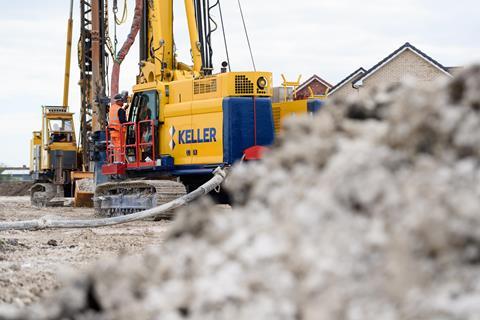Ground engineer says cost of putting diesel into its machines will jump as oil prices rocket
Keller has warned clients to expect firms to start passing on escalating fuel costs as the price of oil yesterday reached a 14-year high following Russia’s invasion of Ukraine.
The ground engineering contractor said the price of putting diesel into its fleet of machines was set to shoot up in the coming weeks with the hike being driven by uncertainty over whether the US and European allies will ban imports of Russian oil along with delays in the potential return of Iranian crude to global markets – with this linked to talks to revive Iran’s 2015 nuclear deal.
Keller does not carry out work in Russia or Ukraine but chief executive Michael Speakman said: “The price of fuel will be a global impact [of the war] – principally the cost of putting diesel in our machines. We will be looking to pass that on to our clients.”

The firm said it had a couple of staff working in Ukraine’s capital Kyiv who have now moved to the west of the country while a further 20 Ukrainian nationals are based across the border in Poland.
“What’s going on is awful,” Speakman said. “We’re supporting our staff and I know three of them have brought their families out of Ukraine and into Poland.”
The firm has close to 600 people based in Poland’s capital Warsaw where it carries out around £115m worth of business in the country.
Speakman added: “As a business, the war doesn’t have a direct impact but I think steel prices in Europe might go up a little bit.”
Ukraine is normally among the top five exporters of steel into the EU but several steel producers in the country, including ArcelorMittal and Metinvest Holding, have been forced to mothball their plants due to the war.
And Speakman said the conflict could see clients in Europe pause jobs until the crisis had eased. “North America is pretty isolated from this but for us an indirect impact [of the war] might be on client demand in Europe. Private clients might sit on their hands a couple of months longer than they would have.”
Meanwhile, Keller said it has paid back the furlough money it claimed from the UK government during the covid-19 pandemic.
The firm has not given a figure of how much it received but Speakman said it was less than £1m. “It was just the right thing to do,” he said of the decision to return the cash. “I always think in situations like this: ‘what would you tell your mum?’ Would you be proud? You have to take social responsibility seriously.”
Keller said it would pay out a dividend in July, adding that it has increased or maintained the dividend over the last 27 years since first listing on the London Stock Exchange.
Its UK business, which is working on the HS2 railway, accounted for around £115m of its improved turnover last year and Speakman said: “UK sales are around 3% of business and that will grow over time. We should a see a reasonable amount of investment [in the UK] in the next few years.”
A restructuring of the business across Europe, the Middle East and Africa cost the firm £7.3m last year on top of the £16.6m it shelled out in 2020 with Speakman adding that the “major stuff” had now been completed.
Keller operates in over 100 countries with the US accounting for more than half of its global workloads. Revenue from North America last year was up 15% to £1.3bn. “The US weathered covid more flexibly than other nations probably because it’s got the space and resource,” Speakman said.
Group turnover was up 8% to £2.2bn last year with pre-tax profit up 12% to £71.6m. Operating profit was down 16% to £93m but analysts are expecting this to hit £109m this year – just below the £110m recorded in 2020. Turnover is expected to be around £2.3bn.




























No comments yet